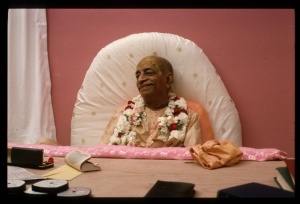SB 6.17.12: Difference between revisions
m (1 revision(s)) |
m (Text replacement - "==== <div class=" to "==== <div class=") |
||
| Line 1: | Line 1: | ||
{{info | {{info | ||
|speaker=Goddess | |speaker=Goddess Pārvatī, wife of Lord Śiva | ||
|listener=King Citraketu | |listener=King Citraketu | ||
}} | }} | ||
[[Category:Srimad-Bhagavatam - Canto 06 Chapter 17]] | |||
[[Category:Bhagavatam Verses Spoken by Parvati, wife of Lord Siva - Vanisource|061712]] | |||
<div style="float:left">'''[[Srimad-Bhagavatam]] - [[SB 6|Sixth Canto]] - [[SB 6.17: Mother Parvati Curses Citraketu|Chapter 17: Mother Pārvatī Curses Citraketu]]'''</div> | |||
<div style="float:right">[[File:Go-previous.png|link=SB 6.17.11]] '''[[SB 6.17.11]] - [[SB 6.17.13]]''' [[File:Go-next.png|link=SB 6.17.13]]</div> | |||
{{RandomImage}} | |||
==== TEXT 12 ==== | ==== TEXT 12 ==== | ||
<div class="verse"> | |||
<div | :na veda dharmaṁ kila padmayonir | ||
na veda dharmaṁ kila padmayonir | :na brahma-putrā bhṛgu-nāradādyāḥ | ||
na brahma-putrā bhṛgu-nāradādyāḥ | :na vai kumāraḥ kapilo manuś ca | ||
na vai kumāraḥ kapilo manuś ca | :ye no niṣedhanty ati-vartinaṁ haram | ||
ye no niṣedhanty ati-vartinaṁ haram | |||
</div> | </div> | ||
| Line 17: | Line 22: | ||
==== SYNONYMS ==== | ==== SYNONYMS ==== | ||
<div class="synonyms"> | |||
<div | ''na''—not; ''veda''—knows; ''dharmam''—the religious principles; ''kila''—indeed; ''padma-yoniḥ''—Lord Brahmā; ''na''—nor; ''brahma-putrāḥ''—the sons of Lord Brahmā; ''bhṛgu''—Bhṛgu; ''nārada''—Nārada; ''ādyāḥ''—and so on; ''na''—nor; ''vai''—indeed; ''kumāraḥ''—the four Kumāras (Sanaka, Sanat-kumāra, Sananda and Sanātana); ''kapilaḥ''—Lord Kapila; ''manuḥ''—Manu himself; ''ca''—and; ''ye''—who; ''no''—not; ''niṣedhanti''—order to stop; ''ati-vartinam''—who is beyond laws and orders; ''haram''—Lord Śiva. | ||
</div> | </div> | ||
| Line 25: | Line 29: | ||
==== TRANSLATION ==== | ==== TRANSLATION ==== | ||
<div class="translation"> | |||
<div | |||
Alas, Lord Brahmā, who has taken his birth from the lotus flower, does not know the principles of religion, nor do the great saints like Bhṛgu and Nārada, nor the four Kumāras, headed by Sanat-kumāra. Manu and Kapila have also forgotten the religious principles. I suppose it to be because of this that they have not tried to stop Lord Śiva from behaving improperly. | Alas, Lord Brahmā, who has taken his birth from the lotus flower, does not know the principles of religion, nor do the great saints like Bhṛgu and Nārada, nor the four Kumāras, headed by Sanat-kumāra. Manu and Kapila have also forgotten the religious principles. I suppose it to be because of this that they have not tried to stop Lord Śiva from behaving improperly. | ||
</div> | </div> | ||
__NOTOC__ | |||
<div style="float:right; clear:both;">[[File:Go-previous.png|link=SB 6.17.11]] '''[[SB 6.17.11]] - [[SB 6.17.13]]''' [[File:Go-next.png|link=SB 6.17.13]]</div> | |||
__NOTOC__ | |||
__NOEDITSECTION__ | |||
Revision as of 15:36, 14 November 2018

A.C. Bhaktivedanta Swami Prabhupada
TEXT 12
- na veda dharmaṁ kila padmayonir
- na brahma-putrā bhṛgu-nāradādyāḥ
- na vai kumāraḥ kapilo manuś ca
- ye no niṣedhanty ati-vartinaṁ haram
SYNONYMS
na—not; veda—knows; dharmam—the religious principles; kila—indeed; padma-yoniḥ—Lord Brahmā; na—nor; brahma-putrāḥ—the sons of Lord Brahmā; bhṛgu—Bhṛgu; nārada—Nārada; ādyāḥ—and so on; na—nor; vai—indeed; kumāraḥ—the four Kumāras (Sanaka, Sanat-kumāra, Sananda and Sanātana); kapilaḥ—Lord Kapila; manuḥ—Manu himself; ca—and; ye—who; no—not; niṣedhanti—order to stop; ati-vartinam—who is beyond laws and orders; haram—Lord Śiva.
TRANSLATION
Alas, Lord Brahmā, who has taken his birth from the lotus flower, does not know the principles of religion, nor do the great saints like Bhṛgu and Nārada, nor the four Kumāras, headed by Sanat-kumāra. Manu and Kapila have also forgotten the religious principles. I suppose it to be because of this that they have not tried to stop Lord Śiva from behaving improperly.